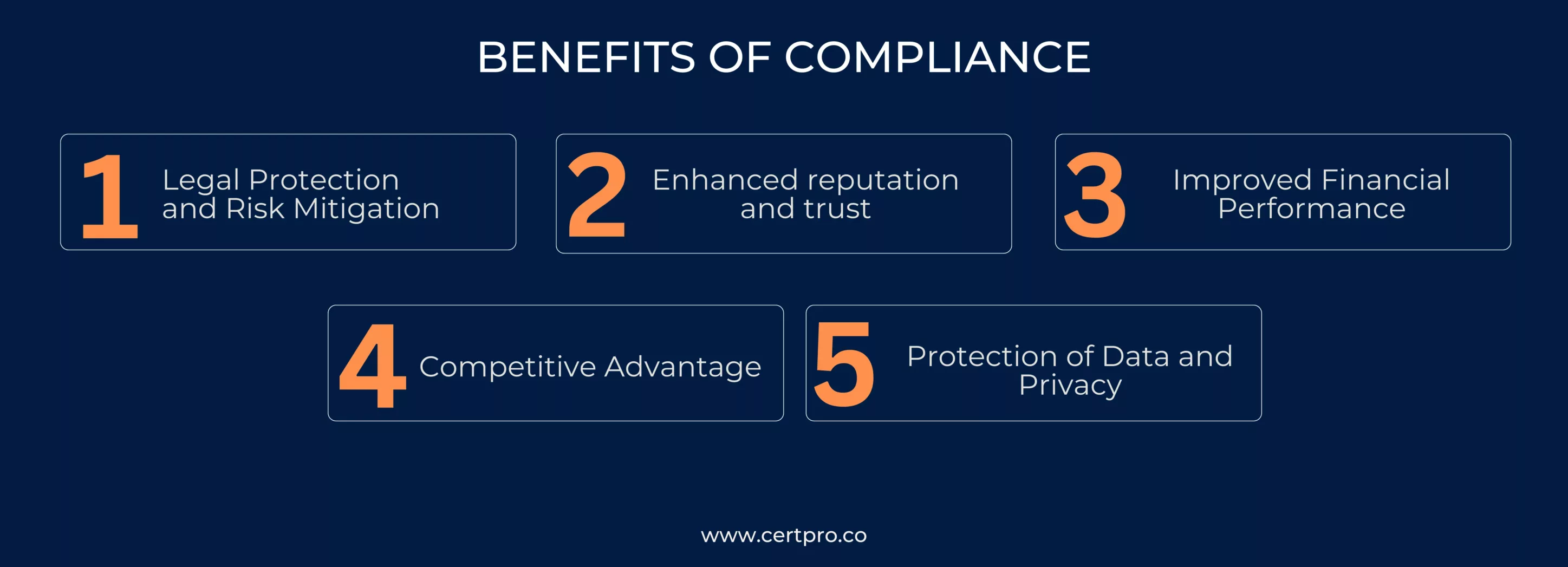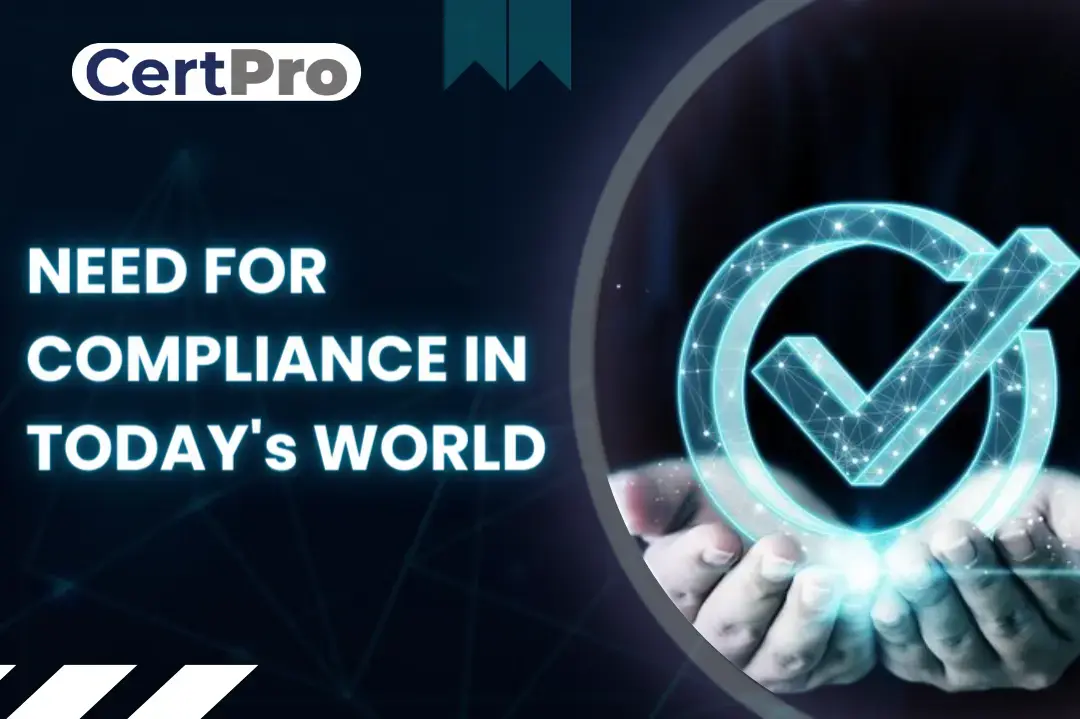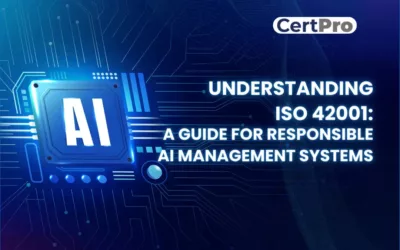In the fast-paced and ever-changing global environment of today, the importance of Compliance has grown significantly. It has become increasingly vital and crucial in today’s world due to the rapid evolution and interconnectivity of various industries and sectors. It refers to the adherence to laws, regulations, and ethical standards governing various industries and sectors. It serves as a safeguard against misconduct, fosters trust and accountability, and promotes sustainable growth.
By understanding the need for it in these various domains, we can appreciate its role in promoting fairness, safeguarding individual rights, fostering trust, and contributing to the overall well-being of society. It also serves as a guiding framework that ensures organizations and individuals operate within established boundaries and adhere to the principles that govern their actions.
This article explores the importance of compliance in today’s world and its implications for businesses, governments, and individuals alike.
COMPLIANCE AND IT’S EVOLVING LANDSCAPE
It refers to following the internal policies or government laws and regulations that their organization is subjected to. It refers to the act of adhering to laws, regulations, policies, and ethical standards that govern an individual, an organization’s behavior, or an industry. It involves following prescribed rules and guidelines to ensure that actions and behaviors align with legal and ethical requirements. This part serves as a framework to promote responsible conduct, transparency, and accountability.
USE OF NEED FOR COMPLIANCE:
The scope is to extend across various domains and sectors, encompassing legal, regulatory, and ethical dimensions. The Key aspects of this are:
1. Legal: It pertains to conforming to laws and regulations set by governing bodies, such as local, national, and international laws. It involves ensuring that operations and actions are within legal boundaries, covering such areas as labor laws, environmental regulations, consumer protection, intellectual property, and data privacy.
2. Regulatory: refers to conforming to specific industry-specific regulations and standards set by regulatory bodies and authorities. Different sectors, such as finance, healthcare, telecommunications, and energy, have their own unique regulatory frameworks that organizations must adhere to. This includes financial regulations like anti-money laundering (AML), health and safety regulations, data protection laws, and sector-specific licensing requirements.
3. Ethical: revolves around upholding moral principles, values, and codes of conduct within an organization. It involves acting ethically, demonstrating integrity, and conducting a business in a socially responsible manner. It includes areas such as fair-trade practices, corporate social responsibility (CSR), anti-corruption measures, and responsible sourcing.
4. Internal Policies: Organizations may establish internal policies and procedures to ensure consistency, alignment, and accountability in their operations. These policies can cover a wide range of areas, including financial reporting, employee conduct, information security, quality management and risk management.
BENEFITS OF COMPLIANCE
Compliance offers numerous benefits for organizations in today’s world. By adhering to regulations and industry standards, businesses can ensure ethical practices, maintain trust with stakeholders, and minimize legal and financial risks. Compliance also helps protect sensitive data, prevent fraud and corruption, and promote a level playing field within industries. Moreover, compliance demonstrates a commitment to responsible governance and can enhance the reputation of the organization. By embracing compliance, businesses can safeguard their operations, foster sustainable growth, and contribute to a more transparent and accountable business environment. There are some key benefits:
1. Legal Protection and Risk Mitigation: It helps organizations adhere to applicable laws, regulations, and standards, reducing the risk of legal penalties, fines, and reputational damage. By actively identifying and addressing gaps, organizations can mitigate legal risks and ensure a safe and secure operating environment.
2. Enhanced reputation and trust: It fosters trust among stakeholders, including customers, investors, employees, and the public. When organizations demonstrate this, they build a positive reputation as responsible and trustworthy entities. This can lead to increased customer loyalty, investor confidence, and positive brand image.
3. Improved Financial Performance: These efforts can contribute to improved financial performance. By adhering to financial regulations, organizations ensure accurate financial reporting, minimizing the risk of fraudulent activities and financial mismanagement.
4. Competitive Advantage: This can provide a competitive edge in the market. Many customers and partners prefer to engage with organizations that prioritize compliance, as it demonstrates a commitment to high standards, transparency, and ethical behavior.
5. Protection of Data and Privacy: It deals with data protection and privacy regulations that safeguard sensitive information. By implementing adequate security With these measures and privacy policies, organizations protect customer data, build trust, and mitigate the risk of data breaches.

COMPLIANCE CHALLENGES IN TODAY’S WORLD
In today’s business landscape, organizations face numerous compliance challenges. Rapidly evolving regulations, complex legal frameworks, and emerging technologies make it difficult to keep up with compliance requirements. Globalization adds complexity, requiring the navigation of cultural differences, language barriers, and diverse business practices. The digital age brings cybersecurity risks, data privacy concerns, and the need to adapt to rapidly changing technology landscapes. Additionally, ensuring compliance throughout the supply chain and managing third-party relationships presents challenges. By acknowledging and addressing these compliance challenges, organizations can maintain integrity and navigate the regulatory landscape effectively. These challenges include:
1. Evolving Regulatory Environment: The regulatory landscape is constantly evolving, with new laws, regulations, and standards being introduced or revised regularly.
2. Cross-Border Operations and Globalization: Organizations conducting business across borders face the complexity of complying with different legal and regulatory frameworks.
3. Changing Consumer Expectations and Social Responsibility: Consumers are increasingly conscious of ethical business practices and social responsibility. They expect organizations to demonstrate transparency, sustainability, and responsible behavior.
4. Cultural and organizational Resistance: Establishing a culture within an organization can be challenging. Resistance to change, lack of awareness, and a disconnect between this and business goals can hinder effective implementation.
5. Balancing with Innovation: The requirements can sometimes be perceived as hindering innovation and agility. An organization must strike a balance between obligations and the need for innovation and flexibility, ensuring that it does not limit creativity.
These challenges require proactive measures, including robust programs, investment in technology and expertise, collaboration with regulatory bodies, and fostering a culture throughout the organization.
COMPLIANCE IN DIFFERENT SECTORS
Compliance requirements vary across sectors, reflecting the specific regulations and standards governing each industry. In sectors such as financial services, healthcare, information technology, manufacturing, and energy/utilities, organizations must adhere to industry-specific compliance obligations. Compliance plays a crucial role in enabling businesses to operate ethically, meet legal obligations, and maintain the trust of stakeholders within their respective sectors. It is a critical aspect across various sectors, each with its own unique regulatory framework and requirements. Some examples in different sectors:
1. Financial Services and Banking: The financial services sector must meet stringent requirements to ensure stability, integrity, and consumer protection.
2. Healthcare and Pharmaceuticals: The healthcare and pharmaceutical sectors are heavily regulated to ensure patient safety, privacy, and ethical conduct.
3. Information Technology and Data Privacy: With the increasing reliance on technology, the IT sector focuses on data privacy and security. Organizations must comply with data protection regulations such as the GDPR in the European Union and the CCPA in the United States.
4. Legal and Professional Services: in the legal and professional services sectors, holding ethical standards, maintaining client confidentiality, and ensuring professional conduct
These examples represent a fraction of the sectors that play a crucial role.
ENSURING EFFECTIVE COMPLIANCE
Ensuring effective compliance is vital for organizations to meet regulatory obligations and uphold ethical standards. It involves implementing robust systems and practices to adhere to relevant laws, regulations, and internal policies. By prioritizing compliance, organizations can mitigate legal and reputational risks, foster a culture of integrity, and safeguard their long-term success. The key steps and strategies are:
- Establish a Program: Develop a program tailored to the organization’s specific needs and regulatory requirements. This program includes policies, procedures, and guidelines that outline expectations, roles, and responsibilities.
- Leadership Commitment: Leadership should actively demonstrate commitment and set a tone from the top. Executives and managers should champion compliance, promote ethical behavior, and lead by example, emphasizing the importance of compliance throughout the organization.
- Training and Education: Provide Comprehensive training and education programs to employees at all levels of the organization. Training should cover relevant laws, regulations, policies, and ethical standards.
- Communication and Awareness: Foster a culture by consistently communicating expectations and updates. Establish clear channels of communication to enable employees to seek guidance, report concerns, and raise related issues without fear of retaliation.
- Monitoring and Auditing: Implement monitoring and auditing mechanisms to assess their effectiveness. Regularly review and Assess their processes, controls, and systems to identify any gaps or areas for improvement.
By implementing these strategies, organizations can foster a culture that enhances their ability to meet regulatory requirements, mitigate risk, and maintain trust with stakeholders.
GET EXPERT ASSISTANCE FOR COMPLIANCE IN TODAY’S WORLD.
CertPro is a comprehensive compliance management platform that offers automation and streamlining of various procedures. With its wide range of features and capabilities, CertPro empowers organizations to automate and streamline various procedures, resulting in increased efficiency and improved compliance.
By leveraging CertPro, businesses can streamline their processes, enhance their posture, and achieve and maintain regulatory compliance more effectively. One of the key strengths of CertPro lies in its ability to centralize compliance-related tasks and data. This centralized approach eliminates the need for manual record-keeping and reduces the risk of errors and oversights. By having all compliance-related tasks and data in one place, businesses can easily track and manage their compliance activities in real-time.
FAQ
HOW CAN ORGANIZATIONS ENSURE EFFECTIVE COMPLIANCE THROUGH MONITORING?
Effective compliance requires a comprehensive program, leadership commitment, risk assessments, training, monitoring, and continuous improvement.
HOW DOES COMPLIANCE BENEFIT ORGANIZATIONS?
It protects against risks, enhances reputation, improves financial performance, and provides a competitive edge while demonstrating ethical behavior.
WHAT ARE THE CONSEQUENCES OF NON-COMPLIANCE?
Non-compliance can result in legal penalties, reputational damage, loss of trust, and financial losses for organizations.
WHY IS COMPLIANCE CRUCIAL IN TODAY’S RAPIDLY EVOLVING WORLD?
It is essential to navigate complex regulations, mitigate risks, protect stakeholders, and contribute to a responsible and accountable global environment.
HOW CAN TECHNOLOGY SUPPORT COMPLIANCE EFFORTS?
Technology can support compliance efforts by streamlining data management, automating compliance processes, providing real-time monitoring and reporting, enhancing security measures, and facilitating training and education on regulatory requirements.

About the Author
RAGHURAM S
Raghuram S, Regional Manager in the United Kingdom, is a technical consulting expert with a focus on compliance and auditing. His profound understanding of technical landscapes contributes to innovative solutions that meet international standards.
HOW DOES THE NIST CYBERSECURITY FRAMEWORK FUNCTION, AND WHY IS IT IMPORTANT?
Emerging cyber threats make cybersecurity an essential consideration for organizations handling and managing data. In this regard, the NIST cybersecurity framework applies to improving your cybersecurity program. It is a set of guidelines that helps improve your...
UNDERSTANDING ISO 42001: A GUIDE FOR RESPONSIBLE AI MANAGEMENT SYSTEMS
The invention of artificial intelligence (AI) has changed the operational processes of many industries. However, the rapid growth of technology increases ethical, security, and privacy-related concerns. Therefore, the International Organization for Standardization...
EUROPEAN UNION’S ARTIFICIAL INTELLIGENCE ACT: HOW THIS GROUNDBREAKING LAW AFFECTS YOUR BUSINESS
Nowadays, Artificial Intelligence (AI) is transforming our lives exceptionally well. AI is now streamlining healthcare services, providing virtual assistance, and fulfilling queries. Technologies have boons and curses. Similarly, AI creates many concerns about...




